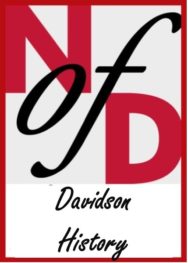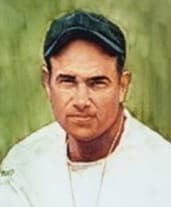NEWS
“Mr. Baseball’s” Field of Dreams

McEver Field on a sunny afternoon.
Youth baseball has been a fixture in Davidson for almost 70 years. The three fields at the end of South Street have hosted almost 200,000 players and served as the site of playoff and tournament games. But it was not always so.
 In his book Olin, Oskeegum, and Gizmo, James Puckett describes the state of youth baseball when he was growing up in Davidson. In the 1950s, town boys played baseball in a vacant lot behind the home of Davidson track coach A. Heath Whittle on Concord Road (demolished in 1965). The field was bounded by Johnsie Shelton’s house, Oscar Theis’s garage, and Nelson Mebane’s yard. The backstop was the side of the old barn once used by the medical college.
In his book Olin, Oskeegum, and Gizmo, James Puckett describes the state of youth baseball when he was growing up in Davidson. In the 1950s, town boys played baseball in a vacant lot behind the home of Davidson track coach A. Heath Whittle on Concord Road (demolished in 1965). The field was bounded by Johnsie Shelton’s house, Oscar Theis’s garage, and Nelson Mebane’s yard. The backstop was the side of the old barn once used by the medical college.
According to Puckett, “We could almost always drum up a game – usually seven or eight showed up. We exchanged players and used ghost runners to keep the game going. No one kept score.” A few of the boys had their own bats, and Heath Whittle provided broken bats from the college that the boys repaired with tape and nails. According to Puckett, “if the bat was beyond repair, we sawed it in two. We would call off play temporarily and hold a brief wake before hammering the broken bat’s handle into the ground. After several seasons we had a sizable bat graveyard.”
According to Puckett, the game was so popular that the boys “spent so much time playing baseball that our grades, which were already bad enough, began to slip further.”

Mr. Baseball, Gene McEver. (courtesy of davidsonwildcats.com)
In the late 1950’s Gene McEver, whom Puckett refers to as “an exceptional community organizer,” appeared on the scene. McEver was an All-American football player from the University of Tennessee and had once coached football at Davidson College. He settled in Davidson in 1936, when he became college’s head football coach, and remained until his death in 1985. In 1951 he was elected to the town board and remained a commissioner until 1969. He stepped down from the board to accept a position as Davidson’s superintendent for public works. He married Joyce Burnett, and they were the parents of four sons.
According to Puckett, McEver and Kenneth Caldwell introduced organized baseball to Davidson in 1958 when they held tryouts on a sandlot located just across the railroad tracks on Griffith Street. (This was probably the field used by the African-American team in town; this field was destroyed when the Sadler Square shopping center was built.)
Tryouts ended with a practice game against Cornelius, intended to decide the final roster. According to Puckett, in the spring of 1959, McEver organized local residents to create a real sandlot field (no grass!) at the end of South Street. They cleared the land, leveled it, and erected fences.
Local businesses donated a limited number of uniforms; the jerseys displayed the name of the business, rather than the player number. J. P. Stowe was the first coach. During their first season, the Davidson team did not win a game. The field continued to improve; by 1960, McEver and other Davidson residents had built bleachers and improved the dugout. Yet another field, this one for Pony League, was added in 1961 below the Little League field.
According to Puckett, “community leaders set out to build the finest field in the Southeast.” The first season was a disaster, but in the spring of 1962 the field was revamped to include new fences, a backstop, lights, and bleachers. Later additions included grass and a “Green Monster” wall. In 1963, the Southeastern Pony League playoffs were held there, as was the North Mecklenburg all-star game.
In 2016 Buddy Caldwell summed up the process this way: “I was nine years old when they started building, doing work in McEver field. That was really incredible to see the town of Davidson come together, all walks of Davidson come together and do the work on that field. Of course, it was the immortal Gene McEver who ruled. He made all the laws and enforced all the laws. Being a sports junkie, having a good, good place to play baseball, it couldn’t get any better than that.”
Gene was the game announcer for over 20 years, and his wife was a fixture at the ballpark concession stands, famous for her hot dogs. Over the years Gene McEver became known as “Mr. Baseball,” and the fields at the end of South Street were named in his honor. In 1963, he received the Algernon Sidney Sullivan award from Davidson College; the citation read “The Faculty of Davidson College by a ‘show of hearts’ would crown the recognition of such excellences by conferring upon you [this award] as upon one who possesses ‘a burning heart, a spacious spirit, and a willing hand.’”
Gene and Joy formally retired from youth baseball in 1982. Gene remained the sectional director of Pony Baseball until 1984, and he was the president of the North Mecklenburg Pony Association until his death in 1985. He is buried in Mimosa Cemetery, right next to the fields he loved.
Today the McEver Fields complex covers seven acres and is managed by the Town of Davidson. Games are organized by the Davidson Youth Baseball Organization, known as one of the best youth baseball organizations in the Lake Norman Area.
Nancy Griffith
Nancy Griffith lived in Davidson from 1979 until 1989. She is the author of numerous books and articles on Arkansas and South Carolina history. She is the author of "Ada Jenkins: The Heart of the Matter," a history of the Ada Jenkins school and center.


